
According to the American Pregnancy Association, almost half of all pregnant women complain of upset stomach, especially after eating meals. Listed below are some causes of an upset stomach during pregnancy and their preventive measures.
Table of Content:-
Food positioning during pregnancy accounts for various maternal and foetal complications and causes severe stomach cramping. Apart from an upset stomach, it can cause vomiting, diarrhoea, nausea and dehydration. Food poisoning occurs if you have consumed food contaminated with pathogenic bacteria, such as E. coli, salmonella or Listeria. During pregnancy, your body is increasingly sensitive to food-borne diseases, thus adopting preventive measures is necessary. A mom-to-be should refrain from consuming street food, stale food and unpasteurised milk. Uncooked or partially cooked food is dangerous too. Before eating snacks, such as hotdog, burger or patties, reheat them until they are steamy.
Also Read: Your Pregnancy Should Be About Smiles, Not Piles
Lactose Intolerance

Are you intolerant to lactose? Well, in such a case, abstain from eating dairy products. Lactose intolerance during pregnancy can cause gas, bloated belly and diarrhoea. It can lead to heartburns, which can cause great discomfort. Asian and Hispanic-American women are more lactose intolerant compared with women of other races. Consuming a dairy product even in small quantity can increase pregnancy discomfort making you experience abdominal pain and bouts of vomiting and nausea. Similarly, fructose intolerance presents the same symptoms. Therefore, if you are fructose intolerant, avoid its sources, such as fruits and honey for your well-being. Also, as a replacement, try to have soy milk to fill in for the milk needs in the body.
Nausea after Overeating

Stomach pain after eating during pregnancy can be associated with nausea post meals. Expecting mums usually complain about sudden food cravings. To satiate themselves, they at times, indulge in binge eating or have too much of their desired food. Overeating makes them nauseated. This is indicative of indigestion. To avoid nausea related stomach pain, pregnant women may take some preventive measures, such as:
Also Read: 6 Major Benefits Of Eating Spinach During Pregnancy To Mother And Child
- Avoid consuming an item if its smell makes you feel sick. If you feel there can be episodes of vomiting, stay away from those food products. Consistent episodes of nausea should be reported to the doctor.
- Consume foods that do not causes nausea, such as saltine crackers, grapes, mashed potatoes. These food items are light on the stomach.
- Upset stomach during pregnancy can be relieved by drinking lemon soda electrolyte-containing drinks with meals
Indigestion

Usually, your body takes over 6 to 24 hours to digest food and eliminate the waste from your body, but during pregnancy, your digestive process slows down extremely to extract additional nutrients from food, thus frequently resulting in indigestion and upset stomach. To prevent indigestion during pregnancy, take smaller and frequent meals and drink plenty of water to facilitate early digestion. Fibre foods are light and require lesser digestion time than oily and calorie-laden foods. Thus, include more fibre-rich items in your diet.
If you persistently experience stomach problems despite taking all the necessary measures, there may be an underlying medical condition pricking your stomach. Talk to your doctor at the earliest.
Read more articles on Women's Health
How we keep this article up to date:
We work with experts and keep a close eye on the latest in health and wellness. Whenever there is a new research or helpful information, we update our articles with accurate and useful advice.
Current Version